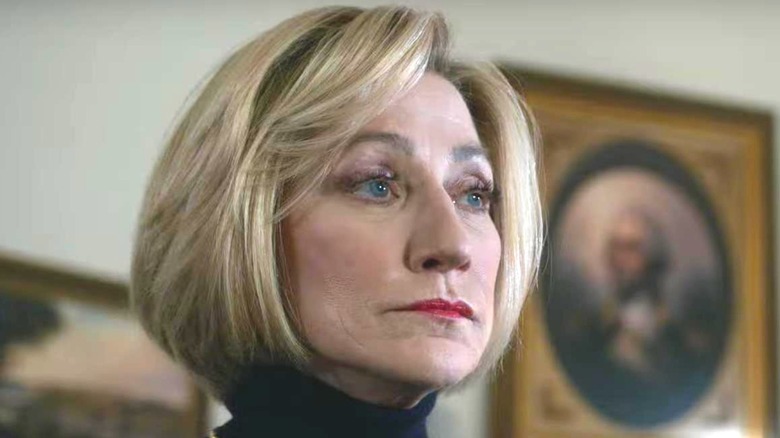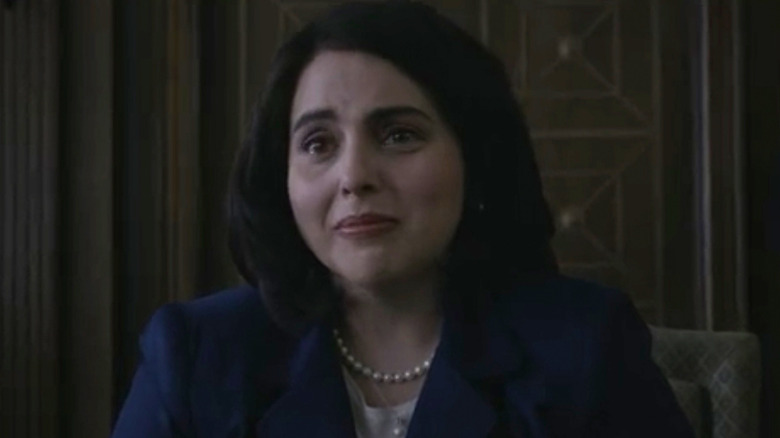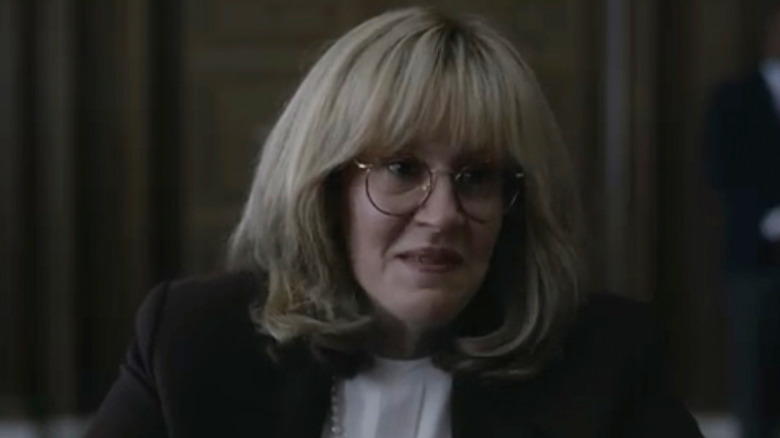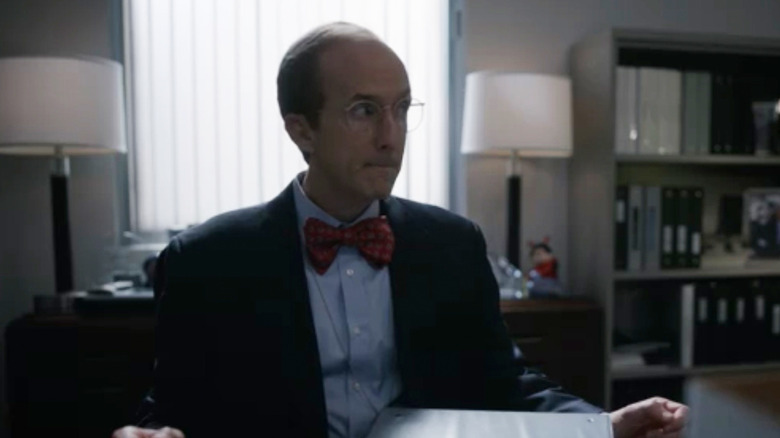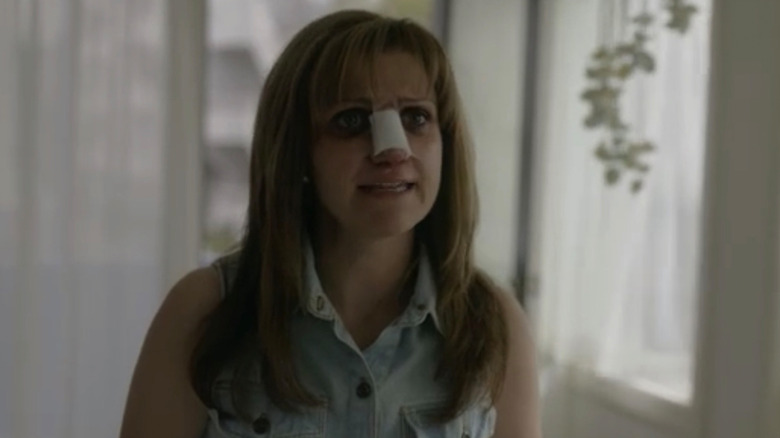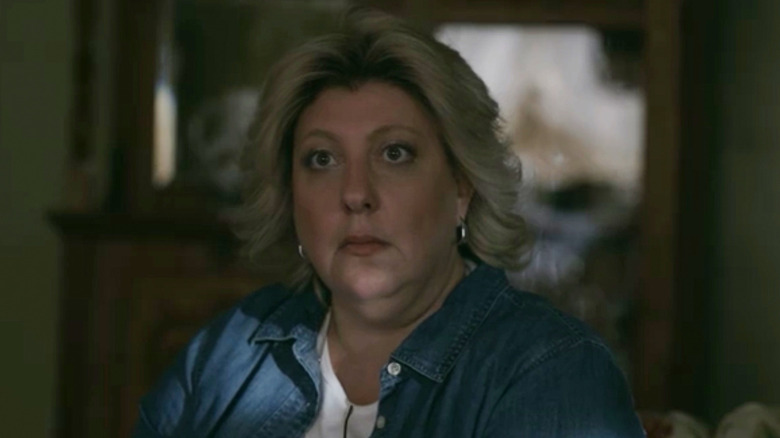How Accurate Is Impeachment: American Crime Story Episode 9?
Contains spoilers for "Impeachment: American Crime Story" Episode 9
"Impeachment: American Crime Story" is the third season of the FX series that dramatizes a headline-grabbing scandal in recent American history. After Season 1 covered the O.J. Simpson murder trial and Season 2 detailed the killing of Gianni Versace, Season 3 chronicles the 1998 impeachment of President Bill Clinton (Clive Owen). The show is mainly told from the point of view of White House intern Monica Lewinsky (Beanie Feldstein), with whom Clinton had an affair, as well as her friend, confidante, and ultimate betrayer Linda Tripp (Sarah Paulson). It also follows Paula Jones (Annaleigh Ashford) and her sexual harassment lawsuit against Clinton.
Last week's episode, "Stand By Your Man," covered the moment when the Lewinsky scandal became public, which included Bill Clinton's infamous deposition and the fallout in his private life. This week, the focus shifts back to Lewinsky and Tripp, who finally give their testimonies in front of a grand jury. With a potential impeachment trial looming, independent counsel Kenneth Starr (Bob Bakkedahl) puts the finishing touches on his report to Congress. This includes interviewing Lewinsky about every encounter she had with Clinton, in graphic detail. Finally, Starr ultimately decides not to include a 1978 sexual assault allegation against Bill Clinton by Arkansas nursing home operator Juanita Broaddrick (Ashlie Atkinson) in his report, relegating it to a footnote.
As always with a show like "Impeachment," some events are portrayed accurately, while others aren't. Here's what's fact and what's fiction from Episode 9, "The Grand Jury."
Monica Lewinsky's grand jury testimony: accurate
When Monica Lewinsky tells her side of the story to 23 jurors, things start off fairly contentious. Some of the jurors want her to explain why she had an affair with a married man and whether she thought it would go anywhere. Lewinsky shows genuine remorse for her role in the scandal, but also admits that she genuinely loves Clinton. Then, as jurors review moments from Lewinsky's ordeal — like her 12-hour interview with FBI agents at the Pentagon City Ritz-Carlton or interviews when she had to recount her sexual relationship with the president in graphic detail — they come to sympathize with her. By the end of her testimony, the jurors offer their forgiveness and give Lewinsky their best wishes.
This is an accurate representation of how Lewinsky's grand jury testimony went. As reported by the New York Times, at a time when just 5% of the American public had a favorable impression of Lewinsky, this was a rare bright spot for her during the scandal. The Times characterized her testimony as a "counseling session" as much as it was a court appearance. Even Lewinsky's final line in the scene is a verbatim quote from the transcript: "I would just like to say that no one ever asked me to lie and I was never promised a job for my silence. And that I'm sorry. I'm really sorry for everything that's happened. And I hate Linda Tripp."
Linda Tripp's grand jury testimony: not accurate
Linda Tripp's grand jury testimony doesn't go nearly as well. After holing up in a hotel to avoid media scrutiny, Tripp appears before a grand jury expecting to be treated like a hero for exposing the Clinton-Lewinsky scandal. Instead, the jurors fixate on why Tripp decided to keep recording her supposed friend, and why she seemingly manipulated Lewinsky into a compromising position. Unable to give a satisfying answer, Tripp eventually claims that she was motivated to act against the Clintons after she suspected that Vince Foster's "suicide" wasn't actually a suicide. In front of the grand jury, Tripp claimed that she felt similarly threatened by the Clintons after her involvement in the Lewinsky scandal became public.
While many of the questions posed by the jurors do reflect the kinds of questions Tripp was asked during the scandal, it doesn't appear that the grand jury itself asked them. Instead, based on transcripts of her testimony, the inquest mostly focused on Tripp's knowledge of Lewinsky's sexual relationship with the president — not her personal motivations or her role as a friend. According to the transcript, Tripp never actually mentioned Vince Foster or the conspiratorial allegations that the Clintons murdered him (via The New York Times).
During the scandal, Tripp frequently did have to explain why she secretly recorded her friend for nearly 20 hours, and whether she "cultivated" Lewinsky to take down the Clintons (via CNN). It just wasn't in front of a grand jury.
Linda Tripp's criminal past: partly accurate
While waiting to testify, Linda Tripp angrily confronts her boss at the Department of Defense, Ken Bacon, for not adequately supporting her during the ordeal. During a heated meeting in Bacon's office, Tripp learns that the DoD is investigating her for lying on a security clearance form, which is a felony. On the form she filled out when she started her job at the DoD, Tripp claimed that was never arrested for a crime, but the DoD has learned that Tripp was arrested for theft when she was 19.
This is a reference to a real-life investigation of Tripp during the Lewinsky scandal. In reality, in 1969 a teenage Tripp was arrested for stealing $243 in cash and a $600 watch from a New York resort town hotel (via The Washington Post). It turned out that her friends had planted the stolen items on her as a prank, and the charges were ultimately dropped. The DoD did investigate whether Tripp had lied on her security clearance form, which did come to light in 1998. What the show leaves out is that Bacon was officially reprimanded for disclosing the information to reporters, which is a breach of the Privacy Act (via The New York Times).
Paula Jones' plastic surgery and lawsuit dismissal: not accurate
Midway through the episode, "Impeachment" turns to Paula Jones and her ongoing sexual harassment lawsuit against Bill Clinton. First, "Impeachment" shows Jones getting an expensive Beverly Hills nose job, with her legal advisor Susan Carpenter-McMillan (Judith Light) at her side. This is partly motivated by the relentless public mockery of Jones' nose.
Later, while recovering from the surgery, Jones gets the news that an Arkansas judge has thrown out her lawsuit against Bill Clinton. This infuriates her husband Steve (Taran Killiam), who wanted the settlement money — even though earlier he had encouraged her to hold out on accepting the settlement until Clinton apologized.
The big inaccuracy here is the timeline. Both events actually happened, but in reverse order. Paula Jones' lawsuit was thrown out in April 1998 (via CNN), months before the episode takes place in the fictional continuity. The nose job happened in July (via the Associated Press).
Juanita Broaddrick's allegation not included in the Starr Report: missing context
Later in the episode, FBI agents visit Arkansas nursing home operator Juanita Broaddrick and convince her to change her earlier testimony to the Paula Jones lawyers, when she denied that Bill Clinton had sexually assaulted her. Broaddrick's allegation, in which she's referred to as "Jane Doe Number Five," then becomes part of the evidence against Bill Clinton. Kenneth Starr only includes it as a footnote in his infamous report.
This is actually how Starr handled the allegation at the time — it was actually a footnote attached to a parenthetical in an appendix. However, "Impeachment" does omit large portions of Broaddrick's story, including how it became part of the investigation.
As reported by Slate's "Slow Burn" podcast about the Clinton impeachment scandal, Juanita Broaddrick claims the sexual assault happened in a Little Rock hotel room in 1978, an assertion Bill Clinton has consistently denied. Broaddrick initially told five people about the incident, but doesn't know how the story spread beyond that. In 1997, Paula Jones' lawyers hired private investigators to interview her about the accusation, and Broaddrick declined to be interviewed — which "Impeachment" did show. Weeks later, Jones' lawyers subpoenaed her, and in early 1998 Broaddrick signed a sworn statement denying it had happened, because she hadn't wanted it to become public in the first place.
Jones' lawyers submitted a legal filing in Arkansas anyway, stating that Clinton had "forcibly raped and sexually assaulted" her. Starr's team approached Broaddrick to ask for her cooperation. Since this was a federal criminal investigation and not a civil lawsuit, Broaddrick agreed.
If you or anyone you know has been a victim of sexual assault, help is available. Visit the Rape, Abuse & Incest National Network website or contact RAINN's National Helpline at 1-800-656-HOPE (4673).
